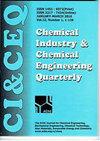石墨烯纳米薄片分散对葵花籽油热物性的影响
IF 0.8
4区 工程技术
Q4 CHEMISTRY, APPLIED
Chemical Industry & Chemical Engineering Quarterly
Pub Date : 2021-01-01
DOI:10.2298/CICEQ210101018B
引用次数: 0
摘要
在本文中,通过改变石墨烯浓度(0.1-1.1wt%)和温度(40-100℃),实验确定了分散在葵花籽油中的石墨烯纳米片的热稳定性、粘度、密度和表面张力。利用扫描电镜和能谱对石墨烯进行了表征。采用超声技术(两步法)制备纳米流体,其最大热稳定性约为280?C在1.1wt%的石墨烯纳米流体中实现。动态粘度随Arrhenius方程呈指数型衰减,样品密度在估计温度范围内呈线性衰减。密度和表面张力随石墨烯浓度的增加而增加,而随温度的升高而相反。在浓度为1.1 wt%的纳米流体中获得了最大的热稳定性、粘度、密度和表面张力,在浓度为0.1 wt%的纳米流体中获得了最小的热稳定性、粘度、密度和表面张力。本文章由计算机程序翻译,如有差异,请以英文原文为准。
Influence of graphene nano-platelets dispersion on the thermo-physical properties of sunflower oil
In this article, thermal stability, viscosity, density and surface tension of Graphene nano-platelets dispersed sunflower oil are experimentally determined by varying the Graphene concentration (0.1-1.1wt%) and temperature (40-100?C). The SEM micrograph and the EDS spectra are used to characterize the Graphene. Nanofluids are prepared by ultrasonication technique (two-step method) and the maximum thermal stability of about 280?C is achieved at 1.1wt% Graphene nanofluids. The dynamic viscosity diminished in an exponential shape in acquiescence with Arrhenius equation and the densities of samples are characteristic with linear decrement in the estimated temperature range. Density and surface tension increases with the Graphene concentration, while a reverse trend is observed with temperature rise. The maximum thermal stability, viscosity, density and surface tension is obtained in the nanofluid with 1.1 wt% concentration and the minimum is obtained in the nanofluid with 0.1 wt% concentration.
求助全文
通过发布文献求助,成功后即可免费获取论文全文。
去求助
来源期刊

Chemical Industry & Chemical Engineering Quarterly
CHEMISTRY, APPLIED-ENGINEERING, CHEMICAL
CiteScore
2.10
自引率
0.00%
发文量
24
审稿时长
3.3 months
期刊介绍:
The Journal invites contributions to the following two main areas:
• Applied Chemistry dealing with the application of basic chemical sciences to industry
• Chemical Engineering dealing with the chemical and biochemical conversion of raw materials into different products as well as the design and operation of plants and equipment.
The Journal welcomes contributions focused on:
Chemical and Biochemical Engineering [...]
Process Systems Engineering[...]
Environmental Chemical and Process Engineering[...]
Materials Synthesis and Processing[...]
Food and Bioproducts Processing[...]
Process Technology[...]
 求助内容:
求助内容: 应助结果提醒方式:
应助结果提醒方式:


